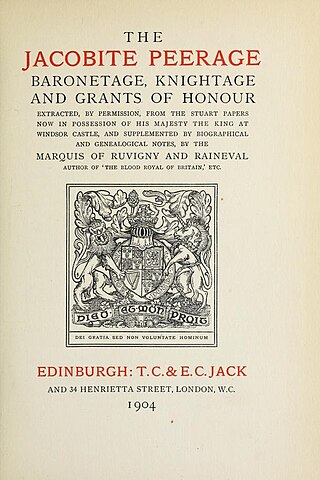Related Research Articles

James Francis Edward Stuart was the House of Stuart claimant to the thrones of England, Ireland and Scotland from 1701 until his death in 1766. The only son of James II of England and his second wife, Mary of Modena, he was Prince of Wales and heir until his Catholic father was deposed and exiled in the Glorious Revolution of 1688. His Protestant half-sister Mary II and her husband William III became co-monarchs. As a Catholic, he was subsequently excluded from the succession by the Act of Settlement 1701.

James FitzJames, 1st Duke of Berwick was a French Royal Army officer and nobleman who was the illegitimate son of James II of England by Arabella Churchill, the sister of John Churchill, 1st Duke of Marlborough. Berwick was a successful general in the service of Louis XIV.

The Jacobite peerage includes those peerages created by James II and VII, and the subsequent Jacobite pretenders, after James's deposition from the thrones of England, Scotland and Ireland following the Glorious Revolution of 1688. These creations were not recognised in English, Scots or Irish law, but the titles were used in Jacobite circles in Continental Europe and recognised by France, Spain and the Papacy.

Richard Talbot, 1st Earl of Tyrconnell, was an Irish politician, courtier and soldier.

Henry Dillon, 11th Viscount Dillon (1705–1787) was an Irish peer and a soldier in French service. He was the colonel proprietor of Dillon's Regiment, an Irish regiment of foot in French service, in 1741–1744 and again in 1747–1767. In the War of the Polish Succession (1733–1735), he fought at the sieges of Kehl and Philippsburg. In the War of the Austrian Succession (1740–1748), he was present at the Battle of Dettingen in 1743, on the French side, while King George II was present on the English side.
Piers Butler, 3rd Viscount Galmoye, otherwise Viscount Galmoy, was an Anglo-Irish nobleman. He was descended from the 10th Earl of Ormond. He was the son of Edward Butler, 2nd Viscount Galmoye, and Eleanor White.

James Francis Fitz-James Stuart, 2nd Duke of Berwick, 2nd Duke of Liria and Xérica was a Jacobite and Spanish nobleman.

Daniel O'Brien, 3rd Viscount Clare, was with King Charles II in exile during the interregnum. At the Restoration, he obtained the title of Viscount Clare for his grandfather and full restoration of the family's lands. At the Glorious Revolution he supported James II, sitting in the Patriot Parliament and fighting for him at the Battle of the Boyne. He was in consequence attainted as a Jacobite.

John Drummond (1714–1747), titular 7th Earl and 4th Duke of Perth, often referred to by his courtesy title Lord John Drummond, was a Franco-Scottish nobleman, soldier and Jacobite.

Lieutenant-General George Ramsay was a younger son of the Earl of Dalhousie and Scottish professional soldier.
Oliver O'Gara was an Irish politician and soldier of the 17th and 18th centuries who was closely identified with the Jacobite cause.
Charles O'Gara was a French-born courtier of Irish parentage who rose to prominence in the service of Leopold, Duke of Lorraine and later his son Francis I, Holy Roman Emperor. Like the rest of his family he was a Jacobite who supported the return of Stuart rule to the British and Irish kingdoms.

Honora Burke became Honora FitzJames, Duchess of Berwick on Tweed, married Patrick Sarsfield and went into French exile where he followed her soon afterwards. After his death at the Battle of Landen, she married James FitzJames, 1st Duke of Berwick, an illegitimate son of James II. She may have introduced the country dance to the French court.
Colonel Brian Mág Samhradháin, head of the McGovern dynasty and Baron or Lord of Tullyhaw barony, County Cavan for a brief period at the end of the 17th century.
Sir Henry Goring, 4th Baronet, of Highden, Washington, Sussex, one of the Goring baronets of Highden, was an English politician who had a part in the Jacobite Atterbury Plot of 1721.

William Dorrington was an English army officer. Contemporary sources often spell his surname as "Dorington", or "Dodington".
Dominic Sheldon, often written as Dominick Sheldon, was an English soldier. A leading Jacobite he served in James II's Irish Army during the Williamite War between 1689 and 1691. He was a noted cavalry commander, present at the Battle of the Boyne and Battle of Aughrim. Later after going into exile, he rose to the rank of lieutenant general in the French Army. He was also remained a prominent courtier at the Jacobite court in exile at Saint Germain.
Daniel O'Brien (1683–1759) was an Irish Jacobite soldier and diplomat who served in the Irish Brigade of the French Army during the War of the Spanish Succession, rising to the rank of colonel. He is often referred to as Colonel Daniel O'Brien.
Colonel Richard Augustus Warren (1705–1775), also known as Sir Richard Warren, was an Irish Jacobite soldier who served in the French Irish Brigade and in the Jacobite rising of 1745. He led the naval mission to rescue Charles Edward Stuart from Scotland in 1746.
Theobald Bourke, also known as Toby Bourke and Tobias du Bourk, was an Irish Jacobite courtier, agent and diplomat.
References
- ↑ The Jacobite Peerage p.135